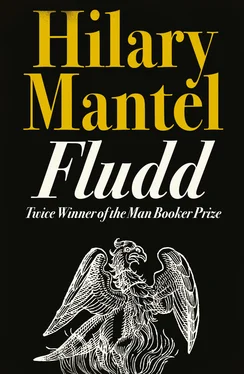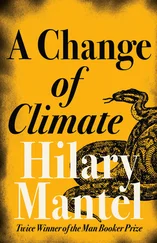‘I take account of that,’ the bishop said. ‘The people of Fetherhoughton are not on a high level. I would not claim that they were.’
‘Then what am I to do?’
‘Everything conspires to improve them, Father. I will not refer to council housing, as I know it is a sore point in this district…’
‘ Requiescant in pace, ’ Father murmured.
‘…but have they not free spectacles? Free teeth? In the times we live in, Father Angwin, everything that can be done to improve their material welfare shall be done, and it is for you to think of improving them in the spiritual line. Now, I have some hints and tips for you, which you will kindly accept from me.’
‘I don’t see why I should,’ Father Angwin said, quite loudly enough to be heard, ‘when you are such an old fool. I don’t see why I can’t be a Pope in my own domain.’ He looked up. ‘Consider me at your disposal.’
The bishop stared; it was a pebbly stare. He pursed his lips and said nothing till he had drunk a second cup. Then, ‘I want to look at the church.’
At this early point, the topography of the village of Fetherhoughton may repay consideration. So may the manners, customs and dress of its inhabitants.
The village lay in moorland, which ringed it on three sides. The surrounding hills, from the village streets, looked like the hunched and bristling back of a sleeping dog. Let sleeping dogs lie, was the attitude of the people; for they hated nature. They turned their faces in the fourth direction, to the road and the railway that led them to the black heart of the industrial north: to Manchester, to Wigan, to Liverpool. They were not townspeople; they had none of their curiosity. They were not country people; they could tell a cow from a sheep, but it was not their business. Cotton was their business, and had been for nearly a century. There were three mills, but there were no clogs and shawls; there was nothing picturesque.
In summer the moorland looked black. Tiny distant figures swarmed over the hummocks and hills; they were Water Board men, Forestry Commission. In the folds of the hills there were pewter-coloured reservoirs, hidden from sight. The first event of autumn was the snowfall that blocked the pass that led through the moors to Yorkshire; this was generally accounted a good thing. All winter the snow lay on the hills. By April it had flaked off into scaly patches. Only in the warmest May would it seem to vanish entirely.
The people of Fetherhoughton kept their eyes averted from the moors with a singular effort of will. They did not talk about them. Someone – it was the mark of the outsider – might find a wild dignity and grandeur in the landscape. The Fetherhoughtonians did not look at the landscape at all. They were not Emily Brontë, nor were they paid to be, and the very suggestion that the Brontë-like matter was to hand was enough to make them close their minds and occupy their eyes with their shoelaces. The moors were the vast cemetery of their imaginations. Later, there were notorious murders in the vicinity, and real bodies were buried there.
The main street of Fetherhoughton was known to the inhabitants as Upstreet: ‘I am going Upstreet,’ they would say, ‘to the Co-op drapers.’ It was not unprosperous. Behind window displays of tinned salmon, grocers stood ready at their bacon slicers. Besides the Co-op draper, the Co-op general store, the Co-op butcher, the Co-op shoe shop and the Co-op baker, there was Madame Hilda, Modes; and there was a hairdresser, who took the young women into private cubicles, segregated them with plastic curtains, and gave them Permanent Waves. There was no bookshop, nor anything of that sort. But there was a public library, and a war memorial.
Off Upstreet ran other winding streets with gradients of one in four, lined by terraced houses built in the local stone; they had been put up by the mill-owners towards the end of the last century, and rented out to the hands. Their front doors opened straight on to the pavement. There were two rooms downstairs, of which the sitting room was referred to as the House; so that in the unlikely event of anyone from Fetherhoughton explaining their conduct in any way, they might say, ‘I cleaned miyoopstairs this morning, this afternoon I am bound fert clean the House.’
The speech of the Fetherhoughtonians is not easy to reproduce. The endeavour is false and futile. One misses the solemnity, the archaic formality of the Fetherhoughtonian dialect. It was a mode of speech, Father Angwin believed, that had come adrift from the language around it. Some current had caught them unawares, and washed the Fetherhoughtonians far from the navigable reaches of plain English; and there they drifted and bobbed on waters of their own, up the creek without a paddle.
But this is a digression, and in those houses there was no scope to digress. In the House there would be a coal fire, no heating in any other room, though there might be a single-bar electric fire kept, to be used in some ill-defined emergency. In the kitchen, a deep sink and a cold-water tap, and a very steep staircase, rising to the first floor. Two bedrooms, a garret: outside, a cobbled yard shared between some ten houses. A row of coalsheds, and a row of lavatories: to each house its own coalshed, but lavatories one between two. These were the usual domestic arrangements in Fetherhoughton and the surrounding districts.
Consider the women of Fetherhoughton, as a stranger might see them; a stranger might have the opportunity, because while the men were shut away in the mills the women liked to stand on their doorsteps. This standing was what they did. Recreational pursuits were for men: football, billiards, keeping hens. Treats were doled out to men, as a reward for good behaviour: cigarettes, beer at the Arundel Arms. Religion, and the public library, were for children. Women only talked. They analysed motive, discussed the serious business, carried life forward. Between the schoolroom and their present state came the weaving sheds; deafened by the noise of the machines, they spoke too loudly now, their voices scattering through the gritty streets like the cries of displaced gulls.
Treeless streets, where the wind blows.
Consider their outdoor (not doorstep) dress. They wore plastic raincoats of a thick, viscous green, impermeable, like alien skins. Should it chance not to rain, the women rolled these raincoats up and left them about the house, where they appeared like reptiles from the Amazon, momentarily coiled in slumber.
For shoes, the women wore bedroom slippers in the form of bootees, with a big zip up the middle. When they went outdoors they put on a stouter version of the same shoe in a tough dark brown suede. Their legs rose like tubes, only an inch or so exposed beneath the hems of their big winter coats.
The younger women had different bedroom slippers, which relatives gave each other every Christmas. They were dish-shaped, each with a thick ruff of pink or blue nylon fur. At first the soles of these slippers were as hard and shiny as glass; it took a week of wear before they bent and gave under the foot, and during that week their wearer would often look down on them with pride, with a guilty sense of luxury, as the nylon fur tickled her ankles. But gradually the fur lost its bounce and spring, and crumbs fell into it; by February its fibres were matted together with chip fat.
From the doorsteps the women stared at passers-by, and laughed. They knew a joke, when it was pointed out to them, but for the most part their entertainment lay in the discernment of physical peculiarities in those around them. They lived in hope of seeing a passer-by with a hunchback, knock knees or a hare lip. They did not think that it was cruel to mock the afflicted, they thought it was perfectly natural; they were sentimental but pitiless, very scathing and unforgiving about any aberration, deviation, eccentricity or piece of originality. There was a spirit abroad in the village that discriminated so thoroughly against pretension that it also discriminated against ambition, even against literacy.
Читать дальше












